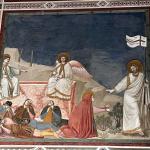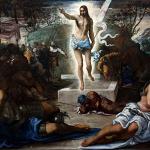INTRODUCTION
Pentecost is a new beginning, when the Spirit that hovered over the waters of the first creation forms the church into a new creation (Genesis 1:2). Pentecost is also a reversal of Babel, as the nations divided by tongues are reunited by a miracle of tongues. Pentecost is the ?coming?Eof Jesus to be with His disciples. But Pentecost is also the fulfillment of Torah and the prophetic promise that God would form a people that would keep Torah.
THE TEXT
?Do we begin again to commend ourselves? Or do we need, as some others, epistles of commendation to you or letters of commendation from you? You are our epistle written in our hearts, known and read by all men; clearly you are an epistle of Christ, ministered by us, written not with ink but by the Spirit of the living God . . . .?E(2 Corinthians 3:1-18).
PENTECOST AND SINAI
Pentecost was an Israelite feast before it was a Christian feast. In the agricultural calendar, the feast of Pentecost celebrated the coming of the firstfruits (Exodus 23:16; Leviticus 23:15-21). Israel?s feasts not only followed the agricultural year, but also recapitulated the history of Israel. Passover recalled the redemption from Egypt, and Booths commemorated Israel?s wilderness wanderings. Pentecost, in the third month, fifty days after the Passover celebration in the first month, celebrated Yahweh?s giving of the Law at Sinai (cf. Exodus 19:1). Pentecost was the great feast of Torah.
Torah was one of Yahweh?s chief gifts to Israel (Romans 9:4), and it was a good gift, offered for the sake of Israel?s life (Romans 7:10). But Israel failed to keep Torah, and so fell under the curse of the Law (Galatians 3:12-13). Yet, the prophets held out the promise that Yahweh would one day renew the covenant with Israel and give Israel new hearts so they could follow His commandments (Jeremiah 31:31-34; Ezekiel 36:25-27). Once Yahweh formed a people that would keep Torah, then they would become instruments for the renewal of the creation, restoring Eden. Ezekiel 36 makes it clear that this restoration comes through the gift of the Spirit.
PAUL?S APOSTLESHIP
After Paul had written the first letter to the Corinthians, some in the church had begun to question Paul?s credentials as an apostle. How could such an unimpressive man, whose life consisted of one apparent failure after another, be a true minister of the good news? Paul spends a good bit of 2 Corinthians defending his apostolic credentials (cf. 1:15-23; 10:1-18; 11:16-33). Paul is not being hypersensitive. He knows that if his apostolic credentials are doubted, then his message is going to be doubted as well. The Corinthians?Econfidence in Paul?s gospel is at stake.
In 2 Corinthians 3, Paul defends his apostleship by referring to the prophetic promises noted above. He claims that he needs no letters of commendation as other teachers might need, since the Corinthians themselves are his ?letter of Christ?E(v. 3). The very fact that the Corinthian church exists and Christians there confess Jesus as Lord and live (however imperfectly) as Christians, is a testimony to the effectiveness of Paul?s ministry. The sheer fact of the Corinthian church is evidence that through Paul?s ministry the Spirit is writing Torah on ?tablets of human hearts?E(v. 3).
PAUL, GREATER THAN MOSES
Paul develops a contrast between his ministry and that of Moses. Moses?Ewas the mediator of a ?ministry of death,?Ethe Torah that prescribed death penalties for various crimes, that tracked the spread of deathly uncleanness with clinical precision, that did not give life but killed. Yet, Paul says, even this ministry of condemnation came with glory (v. 7). If that ministry came with glory, Paul?s ministry, which is a ministry of righteousness, comes with even more glory (v. 9-10). Moses?Eglory faded; the glory of Paul?s ministry does not. This is not because of any inherent superiority in Paul himself. His adequacy is not his own but comes from God. He is adequate because he ministers a ?new covenant?E(v. 6).
Paul describes the superiority of the new covenant through a complex interpretation of the veil that Moses put on his face (Exodus 34:33-35). Moses came down from seeing the glory of God with his face ?shining?E(the Hebrew is ?horned?E Exodus 34:29-30). The people could not look at the glory of His face, and Paul gives us the reason: ?their minds were hardened?E(2 Corinthians 3:14). So long as the Hebrews had hardened minds and hearts instead of hearts and minds of flesh, they could not stand before the glory of God. They could have no face-to-face communion with Him. Paul no doubt means for us to think of another veil as well ?Ethe veil that formed a barrier between Israel and the enthroned glory in the Most Holy Place. That veil too was a result of Israel?s hardness of heart. The Jews of Paul?s day (and ours) still read Moses through that veil. So long as they are living under the letter they are unable to receive Moses.
What removes the veil is repentance, turning to the Lord Jesus (v. 16). The Lord to whom one turns is the ?Spirit?Ewho brings liberty (v. 17). In the context, Paul must be saying that ?turning to the Lord?Esolves the problem of ?hardness of mind.?E When one turns to the Lord who is Spirit, then the mind and heart are renewed so that he can be face-to-face with God?s glory (cf. 4:4-6). The result of the gift of the Spirit is a renewal of the glory of God in man. The Spirit comes to enable us to stand in the presence of God?s glory in Jesus, without any veils, and thus enables us to be transformed into the ?same image?Eof Christ from glory to glory (3:18). This, Paul says, is like a new creation, the shining of light in the original darkness (4:6).
CONCLUSION
The gift of the Spirit brings in a ministry of righteousness, that is to say, through the Spirit hearts are renewed to produce a people that can follow Torah. The Spirit is given to restore the original glory of God?s image to humanity, and to creation.














